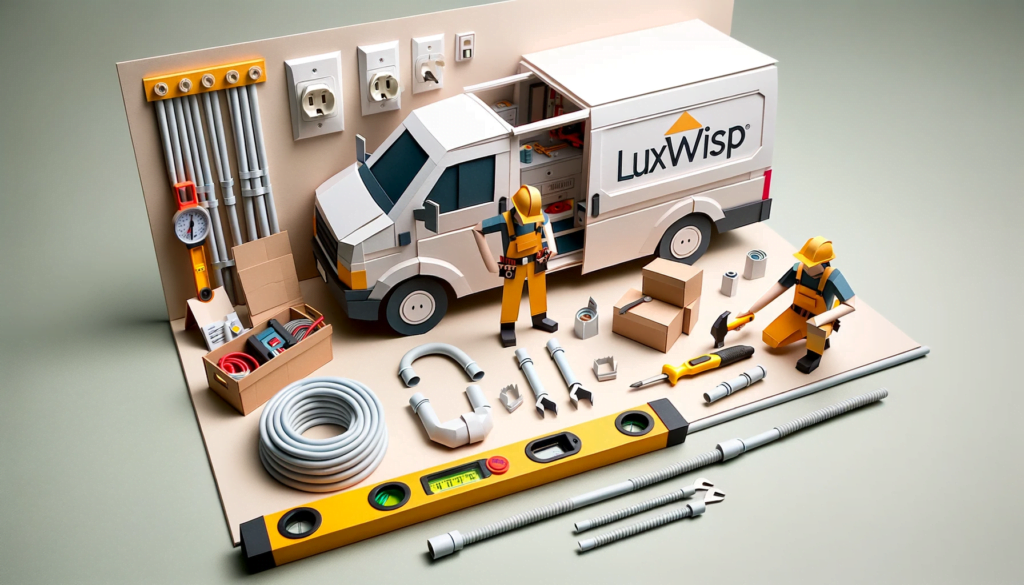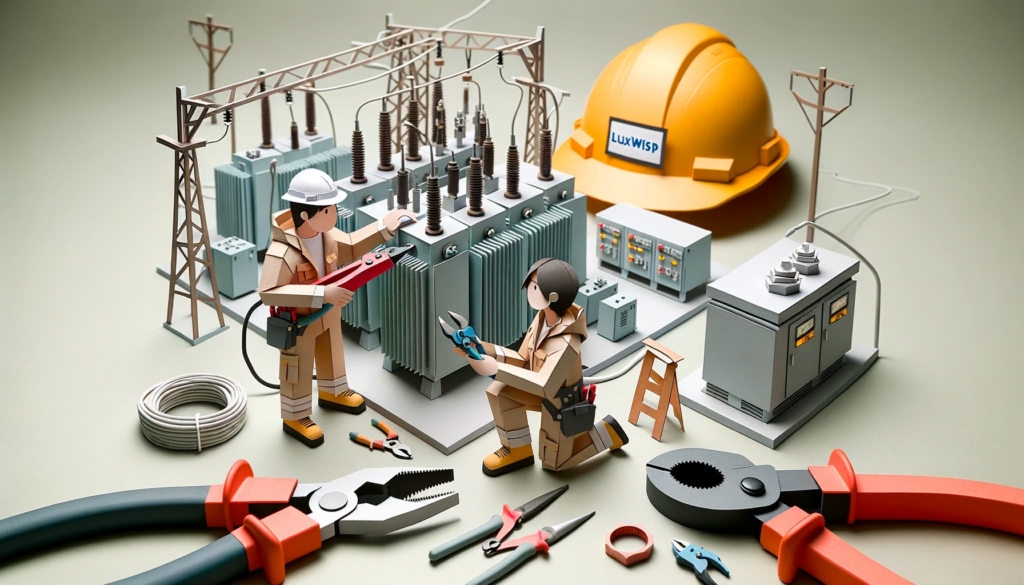The pros of being an electrician are competitive wages, steady job growth, and opportunities for advancement. The high demand for skills, varied work, and no degree requirement are also benefits. Additionally, the ability to earn while training and opportunities for self-employment are advantageous.
The cons of being an electrician are physical demands and safety risks. Licensing requirements can be burdensome, and self-employment may lead to inconsistent income. Apprenticeships are lengthy, and work often involves long days in challenging environments like hot, dirty areas or muddy trenches.
Key Takeaways:
- Job Stability: High demand across industries and regions. Specializations like renewable energy offer additional opportunities.
- Competitive Wages: Average annual salary of $56,180. Overtime, bonuses, and promotions further enhance earnings.
- Independence & Flexibility: Options to work in varied settings (residential, commercial, industrial) or as independent contractors. Diverse scheduling options and autonomy in decision-making.
- Continuous Training & Advancement: Regular training boosts safety and efficiency. New skills lead to certifications, greater job prospects, and career growth.
Facts about Electricians
- Mean Hourly Wage (U.S.): $31.39
- Mean Annual Wage (U.S.): $65,280
- Percentile Wage Estimates:
- 10% earn <$18.00/hr
- 25% earn <$22.69/hr
- 50% earn <$28.96/hr (Median)
- 75% earn <$37.60/hr
- 90% earn >$49.18/hr
- Total Employment (U.S.): 690,050
- Job Growth (2022-2032): 6% (faster than average) for Electricians.
- Yearly Job Openings (2022-2032): 73,500 on average
- Training: Mostly apprenticeships or technical school
- Licensing: Required by most states
- Role: Manage installation, maintenance, and repair of electrical systems.
| Pros of Being an Electrician | Cons of Being an Electrician |
|---|---|
| Competitive Hourly Wage | Physical Demands |
| Steady Job Growth | Safety Risks |
| Opportunities for Advancement | Licensing Requirements |
| High Demand for Skills | Inconsistent Income for Self-employed |
| Structured Training Path | Long Training Period |
| Licensing Adds Credibility | Job Pressures |
| Diverse Work Environments | Ongoing Education |
| Independence in Work | Potential for Job Site Travel |
| Tangible Skillset | Economic Dependency |
| Physical Activity | High Initial Investment |
| Evergreen Skill Set | Erratic Schedules |
| Sense of Accomplishment | Exposure to Elements |
| Essential Service Provider | Potential Client Difficulties |
| Networking Opportunities | Job Saturation in Some Areas |
| Skill Diversification | Continuous Tool Replacement and Equipment Upgrades |
Pros of Being an Electrician

- Competitive Hourly Wage: On average, electricians in the U.S. earn a mean hourly wage of $31.39. This is substantially higher than the federal minimum wage and can provide a comfortable living, especially for those with experience. As one progresses in their career, it’s possible to approach or even surpass the 90th percentile where electricians make more than $49.18/hr.
- Steady Job Growth: The forecasted job growth for electricians between 2022 and 2032 is 6%, which is faster than average. This suggests that there will be continued demand for this profession, ensuring job security and numerous opportunities for those entering or already in the field.
- Opportunities for Advancement: With the percentile wage estimates, it’s evident that as electricians gain more experience and expertise, they can substantially increase their earnings. Those who start at the lower 10% earning less than $18.00/hr have the potential to more than double their earnings with time and skill enhancement.
- High Demand for Skills: With 73,500 yearly job openings on average from 2022 to 2032, there’s a clear indication of the demand for skilled electricians. This high demand ensures consistent employment opportunities across different regions and industries.
- Structured Training Path: Most electricians undergo apprenticeships or attend technical schools, providing a clear and structured path to acquiring the necessary skills. This systematic training allows for a seamless transition into the workforce.
- Licensing Adds Credibility: While obtaining a license might seem like a hurdle, it’s a factor that adds credibility to an electrician’s profession. Being licensed means that the electrician meets certain standards, which can lead to trust and more job opportunities.
- Diverse Work Environments: Electricians aren’t limited to one kind of setting or industry. They can work in residential, commercial, or industrial settings, offering a varied work environment which can keep the job interesting and challenging.
- Independence in Work: Many electricians operate independently or start their own businesses. This autonomy allows them to set their own schedules, choose their clients, and potentially earn more than salaried counterparts.
- Tangible Skillset: The skills acquired as an electrician are tangible and practical. They can be applied in various real-world scenarios, from home repairs to major industrial projects, making the profession versatile.
- Physical Activity: Being an electrician often involves physical work, which can be beneficial for those who prefer a hands-on job over a desk-bound one. This can also promote better health due to increased physical activity during work.
- Evergreen Skill Set: Electrical work is fundamental to modern society. No matter how technology evolves, there will always be a need for those who understand and can work with electrical systems. This gives electricians a certain job security in an ever-changing job market.
- Sense of Accomplishment: There’s a tangible sense of accomplishment in completing an electrical project, whether it’s wiring a new house or fixing a malfunctioning system. This can provide electricians with a feeling of satisfaction and purpose in their daily tasks.
- Essential Service Provider: Electricians are essential service providers, especially during times of emergencies or natural disasters. Being in such a pivotal role can instill a sense of pride and importance in one’s profession.
- Networking Opportunities: Working in various settings, from homes to businesses, allows electricians to meet and network with a wide range of people. This can lead to additional job opportunities, recommendations, or even potential business partnerships.
- Skill Diversification: The electrical field is vast. Electricians have the opportunity to specialize in various areas such as renewable energy, automation systems, or smart home technologies, allowing for continuous learning and diversification of skills.
Cons of Being an Electrician

- Physical Demands: While the physical aspect can be a pro for some, it can also be taxing. Electricians often need to stand for long hours, work in confined spaces, or lift heavy objects, which can lead to physical strain or injuries over time.
- Safety Risks: Dealing with electrical systems inherently comes with risks. Electricians are exposed to the dangers of electric shocks, burns, and other potential hazards if safety protocols are not strictly adhered to.
- Licensing Requirements: While licensing adds credibility, obtaining and maintaining a license can be a tedious process. Most states require electricians to be licensed, meaning periodic renewals and potential ongoing education requirements.
- Inconsistent Income for Self-employed: Electricians who operate independently or own their businesses might face periods of inconsistent income, especially during economic downturns or off-peak seasons.
- Long Training Period: Apprenticeships can last for several years, which means that trainees might earn less than fully qualified electricians for a significant period before they’re considered skilled.
- Job Pressures: Due to the critical nature of electrical systems, electricians might face pressures to complete jobs quickly, especially during emergencies. This can lead to long hours and the potential for burnout.
- Ongoing Education: The electrical field is continuously evolving with new technologies and standards. Electricians might need to invest time and money in ongoing education to stay current and relevant.
- Potential for Job Site Travel: Electricians might need to travel to various job sites, which can be time-consuming. This can also mean irregular hours and potential disruptions to personal and family life.
- Economic Dependency: The demand for electricians can be influenced by economic conditions. During economic downturns, construction projects might be reduced, leading to decreased demand for electrician services.
- High Initial Investment: Starting as an electrician might require a significant investment in tools, equipment, and training. This initial cost can be a barrier for some individuals considering this career path.
- Erratic Schedules: Electricians might be called upon during odd hours, especially if they offer emergency services. This can lead to disrupted sleep patterns, long nights, or weekend work, making work-life balance challenging.
- Exposure to Elements: Electricians often have to work outdoors, which means they might be exposed to various weather conditions, from intense heat to cold or rainy environments. This can make some jobs physically challenging.
- Potential Client Difficulties: Dealing directly with clients can sometimes be challenging, especially if there’s a disagreement over work quality, pricing, or other issues. This can lead to stress and potential conflicts.
- Job Saturation in Some Areas: While the overall growth for electricians is positive, some areas might have a saturation of electricians, making it challenging for newcomers to establish themselves or find consistent work.
- Continuous Tool Replacement and Equipment Upgrades: As technology evolves, the tools and equipment used by electricians might become obsolete or worn down. Continuous investment in new tools can be costly and necessary to stay relevant and efficient in the job.
Job Stability
Job stability is one of the advantages of being an electrician. With the increasing reliance on technology and electricity in both residential and commercial settings, the demand for skilled electricians continues to grow. This creates a steady and reliable job market for those in the electrical trade.
Electricians are needed in various industries, including construction, manufacturing, and maintenance. They play a crucial role in installing, repairing, and maintaining electrical systems, ensuring that buildings and equipment operate safely and efficiently. As a result, electricians enjoy a high level of job security, with a consistent demand for their services.
Furthermore, the need for electricians isn’t limited to certain geographic areas. Electrical work is required everywhere, from urban cities to rural communities. This means that electricians have the flexibility to work in different locations, depending on their preferences and opportunities. They can find employment in a variety of settings, such as residential homes, commercial buildings, industrial facilities, and even government institutions.
In addition to job stability, electricians also benefit from competitive wages and opportunities for career advancement. Skilled electricians with experience and additional certifications can earn higher salaries and take on more challenging projects. They can also specialize in specific areas, such as renewable energy or industrial automation, opening up even more career prospects.
Competitive Wages

An electrician can enjoy not only job stability but also competitive wages in the industry. Electricians are highly valued for their skills and expertise, which allows them to command competitive salaries in the market. The demand for qualified electricians is constantly growing, creating a need for their services and driving up wages.
Their competitive wages reflect the importance of their work and the specialized knowledge they possess. With the potential for overtime pay, bonuses, and career advancements, electricians have the opportunity to earn a comfortable living and provide for themselves and their families.
In addition to the financial benefits, competitive wages also contribute to the overall job satisfaction of electricians. Being fairly compensated for their hard work and expertise can boost morale and motivation, leading to a higher quality of work and job fulfillment.
Independence and Flexibility

While working as an electrician, they can enjoy a high level of independence and flexibility in their daily tasks and schedules. This aspect of their job allows electricians to have control over their own work and make decisions on how to approach different projects. Here are some key points about the independence and flexibility that come with being an electrician:
- Varied work environments: Electricians have the opportunity to work in various settings, such as residential, commercial, and industrial. This diversity allows them to experience different work environments and challenges, keeping their job interesting and engaging.
- Self-employment opportunities: Electricians have the option to work as independent contractors, giving them the freedom to choose their own clients and projects. This allows them to have full control over their work and potentially earn higher income.
- Flexible schedules: Electricians often have the flexibility to create their own schedules based on their workload and personal preferences. They can choose to work full-time, part-time, or take on specific projects as needed.
- Autonomy in decision-making: Electricians are entrusted with making decisions regarding the best approach to electrical installations and repairs. They’ve the independence to analyze problems and find effective solutions, which can boost their confidence and professional growth.
- Opportunity for creativity: Electricians have the chance to showcase their creativity in designing electrical systems and finding innovative solutions for complex problems. This aspect of their work adds a sense of fulfillment and satisfaction to their job.
Physical Demands
Being an electrician requires a high level of physical stamina. The job often involves working in physically demanding environments and performing tasks that can be physically exhausting. There’s also a risk of injuries, such as electrical shocks or falls, which can have serious consequences.
Additionally, the physical demands of the job can take a toll on the long-term health of electricians. This can lead to issues like back pain or joint problems.
Physical Stamina Required
The electrician must have the physical stamina to meet the demands of the job. Being an electrician requires a certain level of physical endurance due to the nature of the work. Here are some of the physical demands that an electrician may face:
- Standing for long periods: Electricians often have to stand for extended periods while working on projects, which can be physically taxing.
- Climbing: Electricians may need to climb ladders, scaffolding, or even poles to access electrical systems, requiring strength and balance.
- Lifting heavy equipment: Handling heavy tools, equipment, and materials is a regular part of an electrician’s job, which requires physical strength.
- Working in tight spaces: Electricians may need to navigate cramped spaces, crawl in attics or crawlspaces, which can be physically demanding.
- Repetitive motions: Some tasks, such as wiring or installing fixtures, require repetitive motions, which can cause strain on muscles and joints.
Having sufficient physical stamina is essential for an electrician to perform their duties effectively and safely.
Risk of Injuries

Many electricians face a significant risk of injuries due to the physical demands of their profession. The nature of their work exposes them to potential hazards that can result in accidents and injuries. Electricians often have to work in confined spaces, climb ladders, lift heavy equipment, and handle live wires, all of which increase the chances of accidents occurring. According to the Bureau of Labor Statistics, electricians have one of the highest rates of non-fatal injuries among all occupations. These injuries can range from minor cuts and burns to more serious electrical shocks and falls. It is crucial for electricians to prioritize safety measures and follow proper procedures to minimize the risk of injuries.
| Risk Factors | Examples |
|---|---|
| Confined spaces | Crawling through tight electrical spaces |
| Climbing ladders | Installing and repairing overhead electrical systems |
| Lifting heavy equipment | Carrying heavy tools and machinery |
| Handling live wires | Exposed to electrical shocks |
Long-Term Health Implications
Due to the physical demands of their profession, electricians can experience long-term health implications as a result of the constant strain on their bodies, but they can take steps to mitigate these risks. Here are some of the potential long-term health implications faced by electricians:
- Musculoskeletal problems: The repetitive motions and heavy lifting involved in electrical work can lead to chronic pain in the back, shoulders, and knees.
- Hearing loss: Electricians are exposed to loud noises from power tools and machinery, which can result in long-term hearing impairment.
- Vision problems: Working with bright lights and intricate wiring can strain the eyes, potentially leading to vision problems over time.
- Respiratory issues: Electricians often work in dusty or poorly ventilated environments, putting them at risk for respiratory conditions such as asthma or bronchitis.
- Mental health concerns: The high-stress nature of the job, combined with long hours and tight deadlines, can contribute to mental health issues like anxiety and depression.
To minimize these risks, electricians should prioritize regular exercise, proper lifting techniques, and the use of personal protective equipment. Additionally, taking regular breaks and seeking professional help when needed can also contribute to maintaining good long-term health.
Safety Hazards
Despite the inherent risks involved, electricians often encounter safety hazards while working with live wires and electrical equipment. These hazards can pose serious threats to their well-being if not properly managed. It is crucial for electricians to be aware of these potential dangers and take necessary precautions to ensure their own safety.
One of the primary safety hazards electricians face is the risk of electrical shock. Working with live wires exposes them to high voltage and the potential for electric current to pass through their bodies. This can result in severe injuries or even fatalities. Additionally, electricians may also be exposed to arc flashes and arc blasts, which occur when electrical energy is released in a sudden and explosive manner.
Another safety hazard is the risk of burns. Electricians often work with hot electrical equipment or encounter electrical sparks, which can cause thermal burns if proper protective measures are not taken. Furthermore, working in confined spaces or at heights can increase the risk of falls and injuries.
To engage the audience and provide a visual representation of the safety hazards electricians face, the following table outlines some common safety hazards and their potential consequences:
| Safety Hazard | Potential Consequences |
|---|---|
| Electrical Shock | Severe injuries, fatalities |
| Arc Flashes/Blasts | Burns, hearing loss |
| Falls | Broken bones, head injuries |
Ongoing Training and Education

Continuously updating their skills and knowledge, electricians benefit from ongoing training and education to stay current in the ever-evolving field of electrical work. With advancements in technology and changes in industry regulations, it’s crucial for electricians to stay up-to-date with the latest techniques and best practices.
Here are some key benefits and challenges of ongoing training and education for electricians:
- Enhanced Safety: Ongoing training ensures that electricians are aware of the latest safety protocols and can effectively mitigate potential hazards, reducing the risk of accidents in the workplace.
- Improved Efficiency: Learning new techniques and technologies can help electricians work more efficiently, saving time and resources on projects.
- Expanded Knowledge: Ongoing education allows electricians to broaden their knowledge base, enabling them to take on a wider range of projects and provide better solutions to clients.
- Professional Growth: Continual training and education can lead to professional certifications and credentials, increasing job opportunities and earning potential for electricians.
- Adaptability to Industry Changes: The electrical industry is constantly evolving, and ongoing training ensures that electricians can adapt to new technologies and trends, staying competitive in the market.
Potential for Career Advancement

Being an electrician is about continuous growth. Every project tackled offers invaluable hands-on experience, refining problem-solving skills. However, the journey doesn’t stop there. Specialized certifications in areas like industrial wiring or solar panel installations can set electricians apart, making them industry frontrunners.
Career pathways vary: while some may lean into leadership roles as supervisors, others could venture into starting their own electrical businesses. Notably, with the rise of renewable energy, expertise in sectors like solar installations is in high demand.
For those seeking added leverage in the industry, affiliating with esteemed organizations can be beneficial. The International Brotherhood of Electrical Workers (IBEW) provides invaluable resources and training, enhancing opportunities for its members in the electrical world. Joining such networks can be a significant boost in an electrician’s career trajectory.
Frequently Asked Questions
What Are the Typical Working Hours for an Electrician?
The typical working hours for an electrician can vary based on the specific job and industry. However, they often work full-time and may be required to work evenings, weekends, and holidays for emergency repairs and maintenance.
Are There Any Specific Certifications or Licenses Required to Become an Electrician?
There are specific certifications and licenses required to become an electrician. These qualifications ensure that electricians have the necessary knowledge and skills to perform their job safely and effectively.
How Long Does It Usually Take to Complete an Apprenticeship Program?
It typically takes several years to complete an apprenticeship program and become a certified electrician. The duration varies depending on the program and the individual’s progress.
What Are the Main Differences Between Being a Residential Electrician and a Commercial Electrician?
Residential and commercial electricians have distinct differences. Residential electricians focus on homes and provide services like installing wiring and fixing electrical issues. Commercial electricians work on larger projects like office buildings and factories, handling complex electrical systems.
Can Electricians Specialize in a Specific Area of Electrical Work, Such as Renewable Energy or Industrial Systems?
Electricians can specialize in specific areas of electrical work, such as renewable energy or industrial systems. This allows them to gain expertise and focus on projects that align with their interests and career goals.










